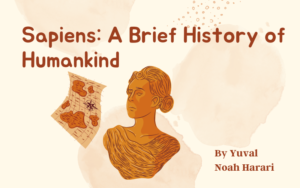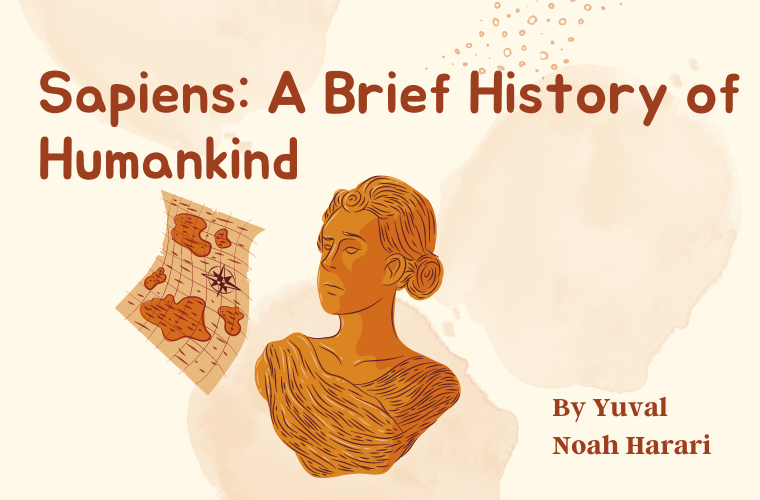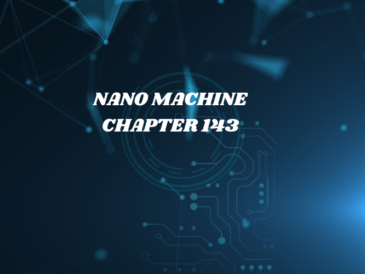
About author
Yuval Noah Harari is an Israeli historian, philosopher, and best-selling author. He was born on February 24, 1976, in Haifa, Israel. Harari is best known for his books “Sapines: A Brief History of Humankind” and “Homo Deus: A Brief History of Tomorrow”, which provide a sweeping overview of human history and explore the future of our species.
Harari received his Ph.D. in History from the University of Oxford and has taught at the Hebrew University of Jerusalem, where he is currently a professor of history. His writing style has been praised for being accessible and engaging.
He is widely regarded as one of the most influential thinkers of our time. In addition to his work as a writer and historian, Harari is also a sought-after speaker, giving talks and lectures on a wide range of topics related to history, philosophy, and the future of our species.
Summary of the book
“Sapiens: A Brief History of Humankind” is a book written by Yuval Noah Harari. It provides an overview of the history of the human species, from the emergence of Homo sapiens in Africa to the present day. The book covers several key turning points in human history, including the Cognitive Revolution, the Agricultural Revolution, the Unification of Humankind, and the Scientific Revolution.
The Cognitive Revolution marked a major turning point in human history, as Homo sapiens developed new forms of communication and ways of thinking that allowed them to cooperate on a larger scale and to create more complex societies.
The Agricultural Revolution was another critical turning point, as humans began to domesticate plants and animals. And to settle in one place to cultivate crops and raise livestock. This allowed them to produce more food than they could gather, and to support larger and more complex societies.
The Unification of Humankind was a process by which disparate human societies gradually came together to form larger and more complex political units. This was facilitated by the development of writing and the use of money. Which allowed for the preservation of information. The spread of ideas over long distances, and for the exchange of goods and services.
The Scientific Revolution was a period of time during the 16th and 17th centuries. When the traditional views of the natural world were challenged and a new scientific understanding of the universe emerged. This period saw major advancements in areas. Such as astronomy, physics, chemistry, biology, and mathematics, and had a profound impact on society and culture.
“Sapiens: A Brief History of Humankind” is widely recognized as an important. And influential work, offering a compelling overview of the history of our species and the key events that shaped it.
The Cognitive Revolution
The Cognitive Revolution is a term used in the book “Sapiens. A Brief History of Humankind” by Yuval Noah Harari to describe the major shift in human evolution that took place about 70,000 years ago. During this time, the human species underwent a major change in the way it thought, communicated, and interacted with the world.
Before the Cognitive Revolution, Homo sapiens were just one of many species of hominids living on the African continent. They had the same physical abilities and cognitive capacities as other hominids.
But after the Cognitive Revolution, Homo sapiens developed the ability to think abstractly, communicate in complex ways. And develop shared myths and beliefs. This allowed them to form larger and more complex social groups, and to cooperate on projects that would have been impossible for other hominids.
The Cognitive Revolution marked a turning point in human history, setting the stage for the development of complex societies and cultures, and paving the way for the later agricultural and scientific revolutions. Harari argues that it is this ability to think abstractly and to cooperate that sets Homo sapiens apart from all other species and has allowed us to become the dominant species on the planet.
The Agricultural Revolution
The Agricultural Revolution is a term used in the book “Sapiens: A Brief History of Humankind” by Yuval Noah Harari to describe a major turning point in human history that took place about 10,000 years ago. Prior to the Agricultural Revolution, Homo sapiens lived as hunter-gatherers, relying on hunting and gathering for their subsistence.
With the advent of agriculture, humans began to domesticate plants and animals, and to settle in one place to cultivate crops and raise livestock. This allowed them to produce more food than they could gather, and to support larger and more complex societies. The Agricultural Revolution also led to the rise of cities. the development of new technologies and social systems, and the growth of trade and commerce.
However, the Agricultural Revolution also brought with it new problems and challenges. The shift to a more sedentary lifestyle led to the growth of disease, and the close proximity of animals and humans led to the spread of new diseases. Additionally, the need to produce large quantities of food put a great deal of pressure on the environment, and led to the depletion of natural resources.
Despite these challenges, the Agricultural Revolution was a critical turning point in human history. And is widely seen as one of the most important developments in the story of our species
The Unification of Humankind
The Unification of Humankind is a term used in the book “Sapiens. A Brief History of Humankind” by Yuval Noah Harari to describe the process by which disparate human societies gradually came together to form larger and more complex political units.
Prior to the Unification of Humankind, human societies were relatively small and isolated, with limited contact with other groups. With the growth of agriculture and the rise of cities, however, human societies began to expand and to interact more with one another. This led to the development of trade networks. The spread of new technologies and ideas, and the formation of larger political entities.
One of the key drivers of the Unification of Humankind was the development of writing and the use of money. Writing allowed for the preservation of information and the spread of ideas over long https://epaper.dawn.com/. While money facilitated trade and the exchange of goods and services. These developments made it possible for people to interact with one another in new and more complex ways, and to form larger and more cohesive political units.
Despite the many challenges and obstacles along the way, the Unification of Humankind. A critical turning point in human history, laying the foundation for the growth of civilizations and the formation of nation-states. Today, our species is more connected than ever before, and. We are continuing to work together to build a more cooperative and sustainable future.
The Scientific Revolution
The Scientific Revolution was a period of time during the 16th and 17th centuries. When the traditional views of the natural world challenged and a new scientific understanding of the universe emerged. This period saw major advancements in areas. Such as astronomy, physics, chemistry, biology, and mathematics, and had a profound impact on society and culture.
One of the key features of the Scientific Revolution was the development. A new approach to scientific inquiry, characterized by systematic experimentation, observation. And the development of theories based on empirical evidence. This new approach facilitated by the invention of the printing press. Which allowed for the spread of new ideas and the dissemination of scientific knowledge.
One of the most famous figures of the Scientific Revolution was Galileo Galilei. Who often referred to as the “father of modern science.” Galileo made major contributions to the field of astronomy. And was one of the first to use a telescope to observe the heavens.
He also made significant contributions to the study of motion and mechanics. And his work laid the foundation for the development of the laws of motion and the theory of universal gravitation.
The Scientific Revolution had far-reaching implications for society and culture. Challenging traditional views of the natural world and paving the way for the development of modern science and technology. It is widely see as one of the most important events in human history. And continues to influence the way we think about the world and our place.
In conclusion
In conclusion, “Sapiens: A Brief History of Humankind” is a fascinating and thought-provoking book that provides a comprehensive overview of the history of the human species.
Written by Yuval Noah Harari, the book covers major turning points in human history, including the Cognitive Revolution, the Agricultural Revolution, the Unification of Humankind, and the Scientific Revolution, and provides insights into the events that shaped our species and the world we live in today.
Whether you’re a history buff or simply looking to gain a deeper understanding of the human experience, “Sapiens: A Brief History of Humankind” is an excellent resource that provides a rich and accessible introduction to the subject. It is a must-read for anyone interested in the history of our species and the events that have shaped the world we live in today.




